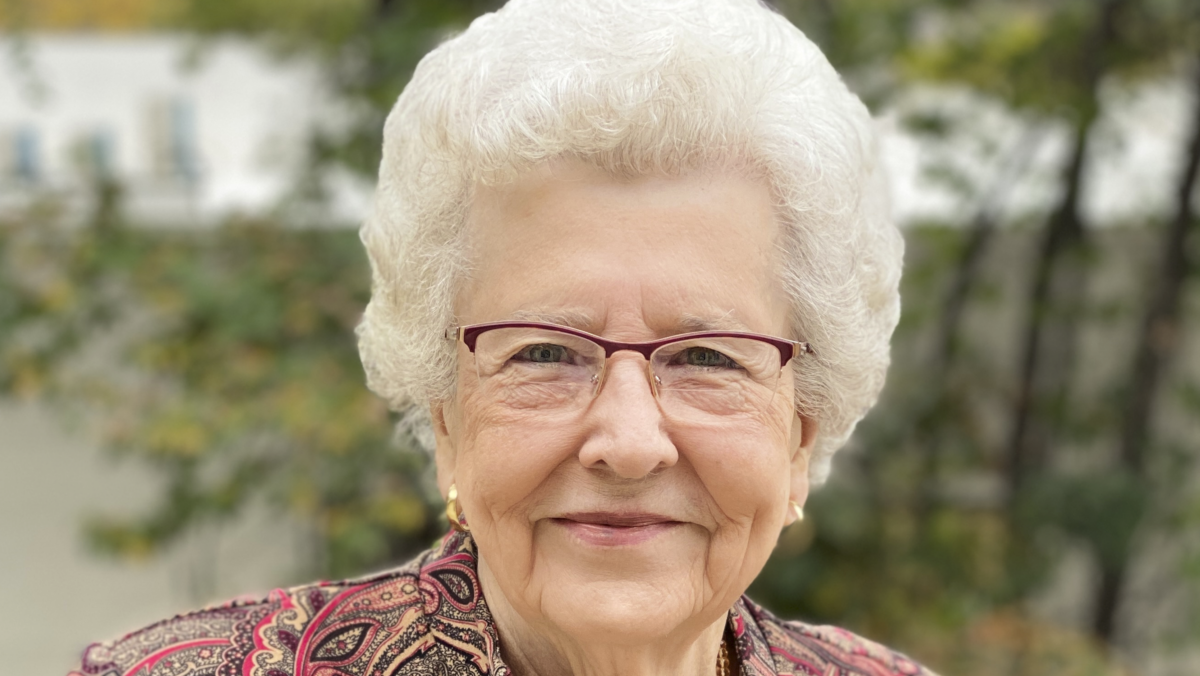By Rosalie Hunt
The Alabama Baptist
Hundreds of thousands of women have been part of Woman’s Missionary Union past; many thousands are presently at work in the Master’s service. Multitudes will follow in the years and decades yet to come.
The face of WMU is multifaceted. It might be quiet and behind the scenes, working unnoticed and unheralded. It might be reaching out and taking a risk. No one woman alone defines WMU. Just as talents vary, so do avenues of service.
A look at one modern WMU woman, however, will give us a sterling example of bridging the years and representing all the best in WMU, both past and present.
Meet June Whitlow, a woman who would have been equally at ease sitting with the initial 32 women in a church basement in Richmond, Virginia, in 1888, or on the platform of leadership in that same city in 1988 when WMU celebrated its 100th anniversary.

A pastor’s daughter, Whitlow was born in Arkansas; she grew up there and in Illinois. After graduating from college, teaching in a high school and working part-time with Illinois WMU, she earned a master of religious education degree from Southwestern Seminary.
In 1964, June worked with Georgia WMU. Three years later, she joined the staff of national WMU as consultant in administration and research. It was only a short time before Whitlow was named director of the education division.
Five years later, she became assistant to the executive director, working alongside the legendary Alma Hunt. In 1983, Whitlow was named associate executive director — remaining in that role until her retirement in 2002.
Whitlow became an institution in herself. Her life and work bridged an era, two centuries and a new millennium. She was an absolutely committed and dependable associate director under four executive directors with very different leadership styles. It speaks volumes about her personality and temperament.
She never sought the limelight but handled every task with keen insight and expertise. She was the ultimate behind-the-scenes team player and made everyone around her look good. Highly skilled as a writer and planner, always able to articulate with incisive clarity WMU’s stance on issues, the lady was an administrator par excellence.
Whitlow became the founding executive director of Baptist Nursing Fellowship in 1983 and 30 years later, was still the beloved director of that organization.
Retirement merely meant a change of routine. She maintained an office at national headquarters in Birmingham, where she volunteered her time in administrating the work of BNF.
So beloved was she to nurses as well as Baptist women in general that a June Whitlow Endowment was set up with the WMU Foundation in 1996 to honor her many contributions to Kingdom work. The endowment provides scholarships for “women in the pews” for training in WMU and missions education.
In turn, Whitlow became a valued member of the WMU Foundation board of trustees, investing her time and love in furthering the undergirding of WMU work for the future.
Lifetime of service
She remained consistently active in her church and its WMU and invested her energies and loving concern as a mentor in Christian Women’s Job Corps. The daughter of Whitlow’s mentee became like a granddaughter. Both of them cherished the relationship.
After she was 80, Whitlow was still serving and leading others, including a stint as director of WMU for Birmingham Metro Association.
The same skills and wisdom, loving personality and infectious sense of humor now touched the lives of another generation of WMU women.
Always impeccably dressed and graceful, never ostentatious, Whitlow’s only aim was to further the cause of missions — a purpose that lives on even after her death Feb. 20, 2024, at the age of 87.
Following the lights
Having gone as far as we could with her in life, we went as far as we could go with her when she died. Curbside on that starless night, we stood by as the black-clad removal team completed their task. We watched and wept as the vehicle’s tail lights were enveloped by the inky darkness.
Tail lights.
Tail lights are designed to enhance communication, give direction and promote the safety of those trailing us on the same road and traveling in the same direction.
Preoccupied with our grief of the moment, we did not realize we were active participants in an acted-out parable. Some day we will follow her again, not to a funeral home whose focused, pink LED bulbs camouflage the ashy paleness of death, but to that wonderful place God has prepared for His prepared people, a city that “does not need the sun or moon to shine on it, for the glory of God gives it lights, and the Lamb is its lamp” (Rev. 21:23).
Jim Auchmuty
FBC Roebuck Plaza
Birmingham
In case you missed these nuggets
Excerpts from the Feb. 29 edition of The Baptist Paper:
‘Crazy preacher’ claims Guinness record with ‘ice mile’
_________________________
Tips for following up with church visitors
_________________________
Helps for parents and churches to reach preteens
_________________________
Keyboard festivals encourage children who change the world
_________________________
10 reasons pastors should reach out to students
_________________________
Worship band 317 Collective wants students to ‘love Jesus better’
_________________________
What obstacles prevent believers from helping others grow in their faith?
_________________________
A Baptist association perspective on the Great Commission Resurgence
_________________________
Former ARITF chair’s purpose behind his investment in newly formed Abuse Response Commission
_________________________
Reduced Southern Baptist Convention CP allocation budget recommended for 2024–25 year (based on current CP giving trends)
_________________________
SBC Executive Committee presidential search team preparing to announce next candidate soon
To read these articles and find out more about The Baptist Paper, visit tbponline.org. Call 800-803-5201 to add the paper to your TAB subscription.
When I talk about issues such as gambling, the evil of abortion, and God’s design for male and female, marriage and family, I am not being political, I am being PROPHETIC.
It is my place (and the place of the church) to advocate for truth and righteousness regardless of the parties in power or favor at the time. Those change. The Word of God never changes. What the true church believes, preaches and lives out never changes.
This is why I never endorse candidates from the pulpit. The pulpit and the church of the Lord Jesus Christ is not aligned with any political party. We are aligned with truth and righteousness. We are aligned with the Lord and His Word. We speak to both parties and call both parties to truth and righteousness.
Greg Corbin
Birmingham
“We must consider many opinions and take ample time to listen, pray and work for positive solutions. … We cannot rely on our own personal likes and dislikes to dictate the likes and dislikes of the population we are trying to attract and engage,” said Mark Whitt, an author and the director of media and strategic relations at the University of Kentucky, who spoke on an episode of Leadership Lessons with Kentucky Baptist Convention Executive Director Todd Gray.
“The problem is that many Christians have made conversion the finish line,” said Ray Sullivan, discipleship consultant for the Georgia Baptist Mission Board. “They think once people have gotten saved, they’ve done their part.”
“I get phone calls every week from churches looking for a worship pastor, and the reality that we’re facing in the church is that we need more worship pastors and leaders to help point people to Jesus through song,” said Michael Glenn of the Texas-based worship band 317 Collective. “We don’t need more performers. We need people who have a true devotion to Jesus leading our local churches in worship.”
There are four primary healthy relationships which may exist between churches and pastors: (1) both churches and pastors hold one another in high regard; (2) both churches and pastors have mutual expectations of one another — a spiritually developing life; love and compassion for people; determination to have meaningful interpersonal relationships, etc.; (3) mutual support — not to him/them but with and for him/them; (4) mutual service — the body of Christ respecting each other and working together to accomplish the ministry of Christ in our particular setting and beyond, with supreme allegiance given to the Head.
Morris Murray
Jasper
Among the top lessons I learned in grief: “My God in his steadfast love will meet me …” (Ps. 59:10). So, “I will sing aloud of your steadfast love in the morning” (Ps. 59:16).
@DRayDavis on X






Share with others: